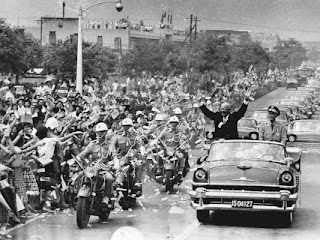Some of the more common known flash points of the Cold War in the United States are the Cuban Missile Crisis of 1962 and the Berlin Crisis of 1958, well known because they directly impacted the United States or involved a European nation. However I was surprised to learn in 1958 there was another major Cold War flash point in Asia, specifically the Second Taiwan Straits Crisis. Furthermore in some ways this particular crisis point appears to have been one of the closest ones to sparking an actual use of atomic weapons by the United States in a conventional conflict.
In 1958 Mao Zedong, China's leader, remained determined to bring the Republic of China, located on Taiwan island, under the control of the People's Republic of China. Previously Mao had launched attacks on small islands controlled by Taiwan, usually through naval shelling, and in 1958 he made a second attempt to do so. However in 1958 the United States was in a unique position to threaten excessive belligerence in response - in 1954 the United States and the Republic of China had signed a defensive agreement, binding the United States to come to the aid of Taiwan if attacked. Furthermore in 1955 Eisenhower had persuaded Congress to pass the "Formosan Resolution" - an authorizing agreement allowing Eisenhower to use whatever force he deemed necessary to defend Taiwan without further consulting Congress.
Eisenhower initially responded to Mao's actions with traditional forces, deploying naval units to the Taiwan Straits and ordering protection of convoys bringing supplies to Taiwan. However the Soviet Union, wanting to avoid an actual conflict between the United States and China, sent diplomats to negotiate a settlement to the crisis. They were horrified to find that Mao, and other top Communist Chinese leaders, were ready for a conflict with the United States and appeared ready to accept possible nuclear weapons attacks against China. Eisenhower, in turn, had accepted defending Taiwan from Communist China would require the use of nuclear weapons and had accepted a United States military plan to use nuclear weapons if needed. Eisenhower even authorized deploying additional nuclear weapons to the region to ensure if they were required they were ready for immediate deployment.
Nikita Khrushchev, leader of the Soviet Union, added to the crisis further on 19 September 1958 when he sent a letter to Eisenhower stating that the Soviet Union had "nuclear and hydrogen bombs as well" and strongly implying if China was attacked, the Soviet Union would respond. The United States at this time though had a massive strategic lead in atomic weapons, in both number and delivery capacity over the Soviet Union, and Eisenhower and the United States military were comfortable with this risk. Eisenhower kept the nuclear forces in Taiwan and refused to back down.
The crisis was ultimately defused by Mao backing down and simply allowing the situation to deescalate. Communist and Republic Chinese forces ended up exchanging shells with each other, filled with propaganda, on alternating days for several months. Communist China kept up its shelling of propaganda shells until 1979 due to this confrontation.
What was surprising to me though was this crisis seemed MUCH more likely to lead to the use of nuclear weapons, Eisenhower and the United States Congress were comfortable with it, China was apparently fine with it, and the Soviet Union would probably have let the exchange take place. Although the Cuban Missile Crisis was closer to an actual launch, this seems more terrifying because the participants seemed far more comfortable with it breaking loose than other crisis points in the Cold War.
Sources: Wikipedia articles on the Second Taiwan Straits Crisis and Eisenhower, and The Cold War - A Very Short Introduction by Robert J. McMahon





